10 Common Signs of Cancer and How to Recognize Them Early
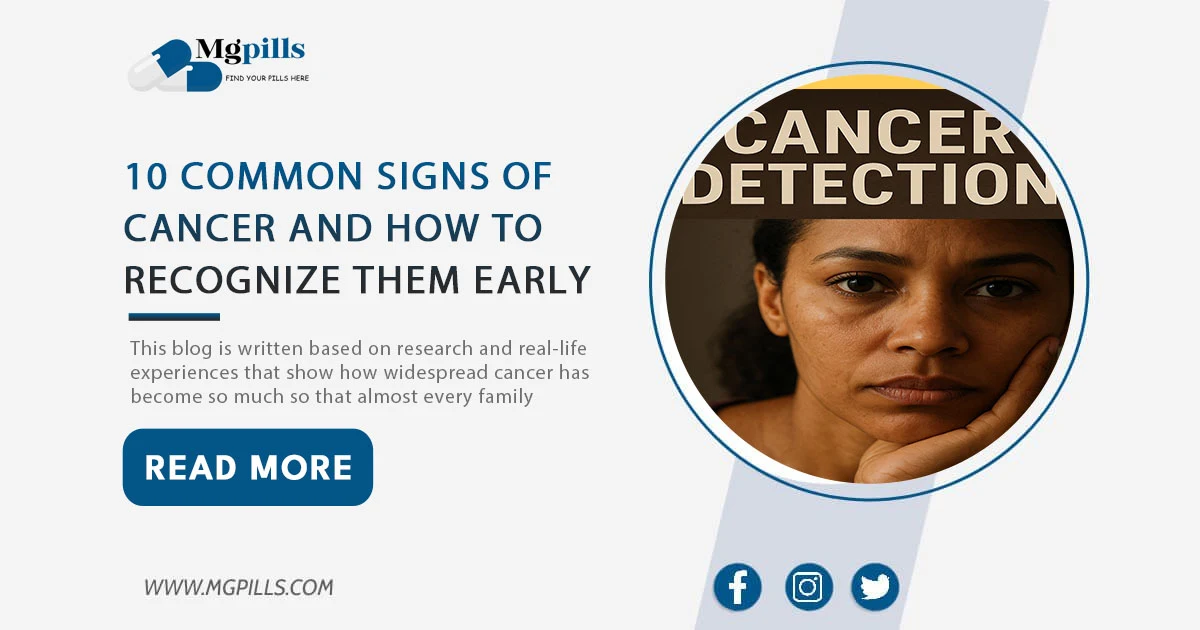
This blog is written based on research and real-life experiences that show how widespread cancer has become so much so that almost every family across the globe knows someone affected by it. Recognizing cancer symptoms early can make a life-saving difference.
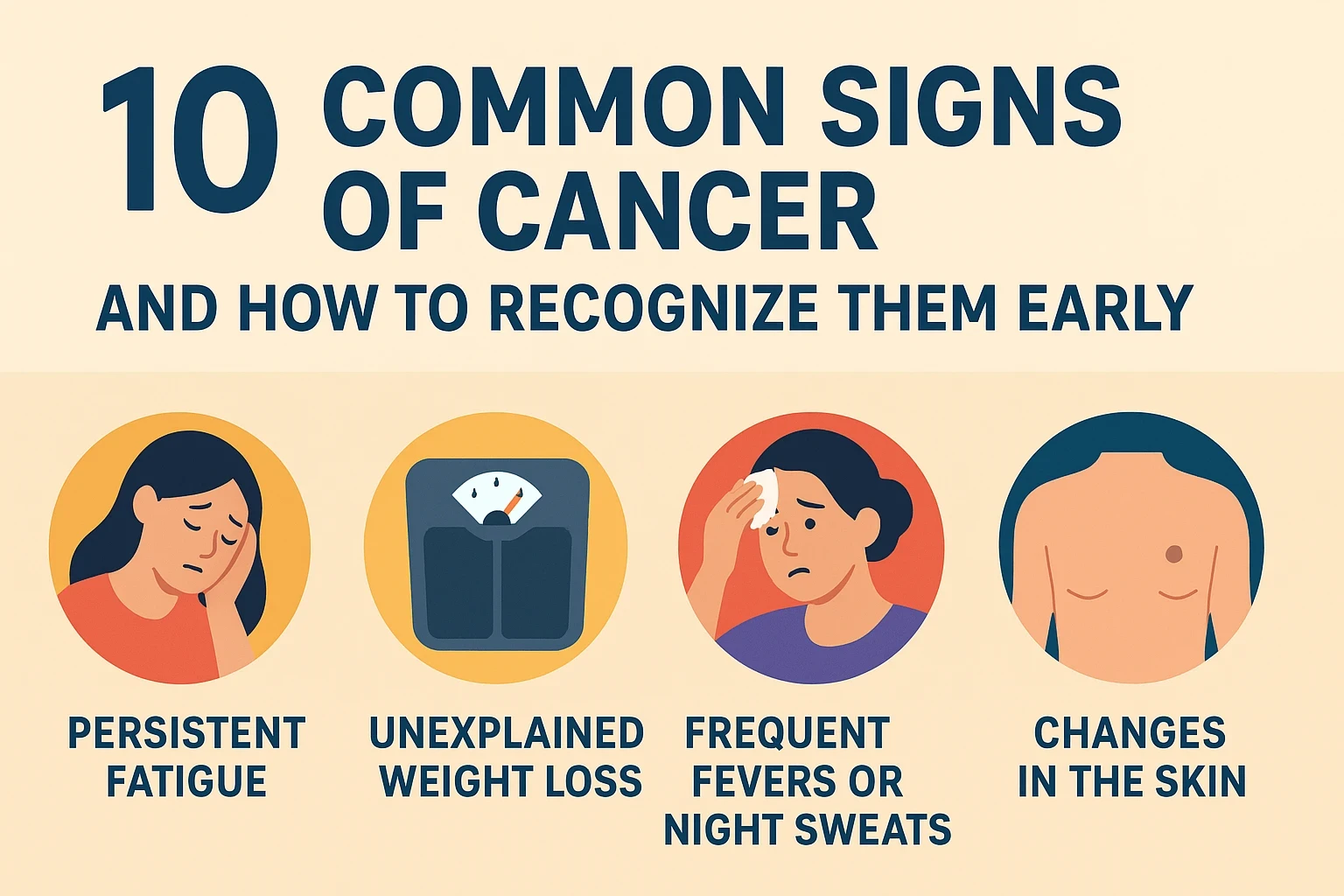
A Real Story: How Early Signs Changed a Life
Two years ago in early 2023s, a 42-year-old mother in California felt constant fatigue and dismissed it as stress. When she later noticed unexplained weight loss and persistent cough, she finally went for a check-up. Doctors diagnosed lung cancer at an early stage giving her the chance for timely treatment. This shows how noticing the signs of cancer early can save lives.
General Body-Wide Symptoms of Early-Stage Cancer
- Unexplained Fatigue
- Persistent tiredness even after rest is one of the most common cancer symptoms.
- Research by Dr. T. Buchwald shows fatigue can result from systemic inflammation caused by abnormal cell growth.
- Persistent tiredness even after rest is one of the most common cancer symptoms.
- Unexplained Weight Loss
- Losing 10+ pounds without dieting can be an early sign of cancer.
- Sir Richard Doll highlighted unintentional weight loss as a key warning symptom in his landmark cancer studies.
- Losing 10+ pounds without dieting can be an early sign of cancer.
- Frequent Fevers or Night Sweats
- Recurring fevers or night sweats may indicate the immune system is fighting abnormal cells, another notable cancer symptom.
- Immunology studies confirm these signs of cancer often appear before other noticeable symptoms, though they are frequently mistaken for infections.
- Recurring fevers or night sweats may indicate the immune system is fighting abnormal cells, another notable cancer symptom.
The Silent Nature of Cancer
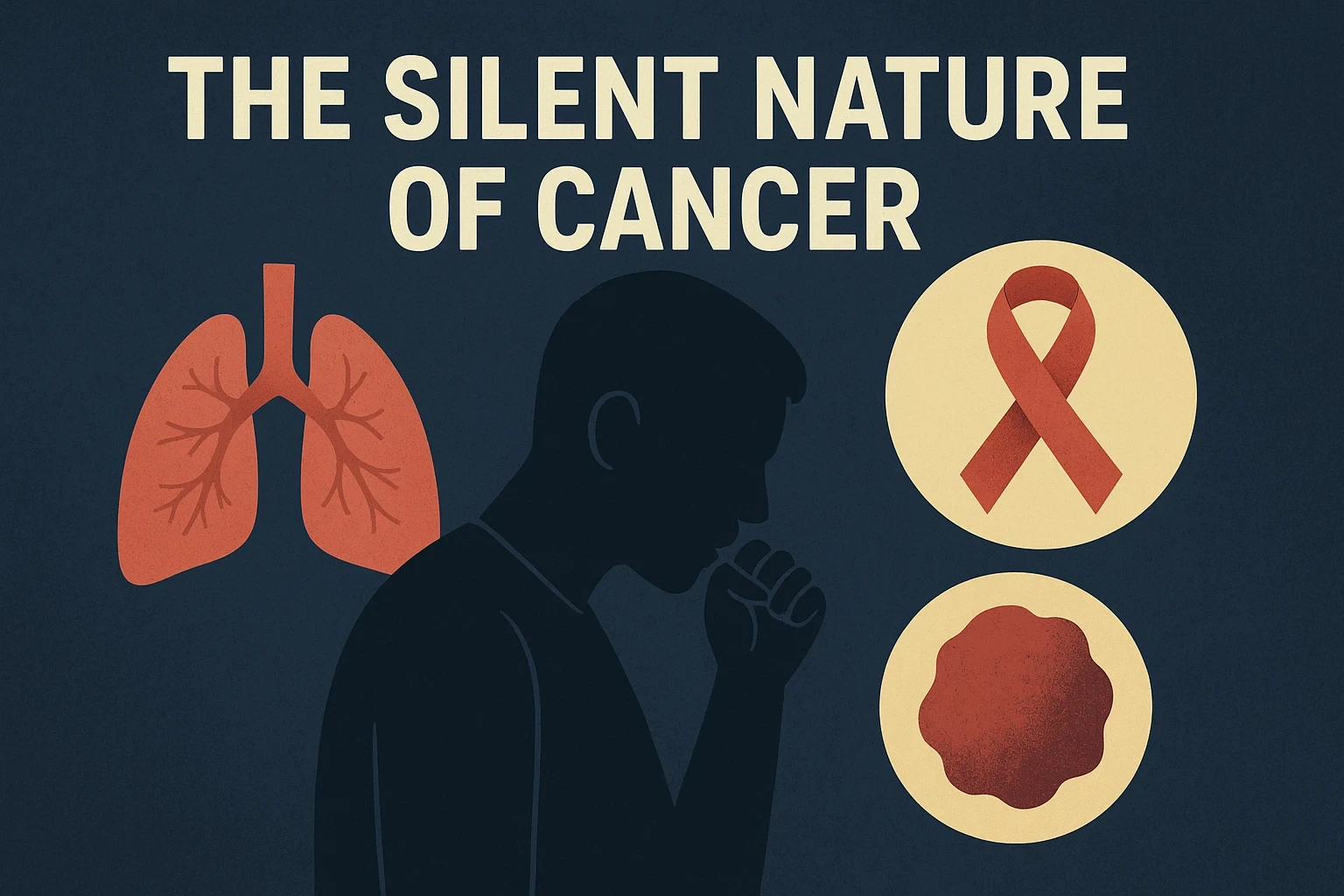
Cancer is often called a “silent disease” because its early signs of cancer can be subtle, easily mistaken for minor ailments, and sometimes ignored altogether. A persistent cough might be dismissed as a lingering cold, or a small lump could be brushed off as harmless. Yet, research shows that the body often sends signals long before a formal diagnosis. Dr. Siddhartha Mukherjee, in The Emperor of All Maladies, emphasizes that cancer’s early symptoms can be deceptively ordinary, making early detection extraordinarily difficult.
Studies suggest that conventional medicine may sometimes fail to recognize these early signs, especially when symptoms are non-specific. For example, unexplained fatigue or night sweats common cancer symptoms are frequently attributed to stress or infection rather than investigated for malignancy.
Real-life patient stories echo this silent danger: Emily, a 34-year-old mother in the US, ignored intermittent abdominal discomfort for months, assuming stress from work. Her diagnosis of early-stage ovarian cancer came only after severe symptoms emerged. Similarly, Dr. Joe Tippens has documented cases where early signs of lung and breast cancers were overlooked, delaying treatment.
The lesson is clear :-\ cancer doesn’t always announce itself dramatically. Awareness of subtle, persistent signs of cancer can mean the difference between early intervention and advanced disease.
10 Early Cancer Symptoms You Should Never Ignore
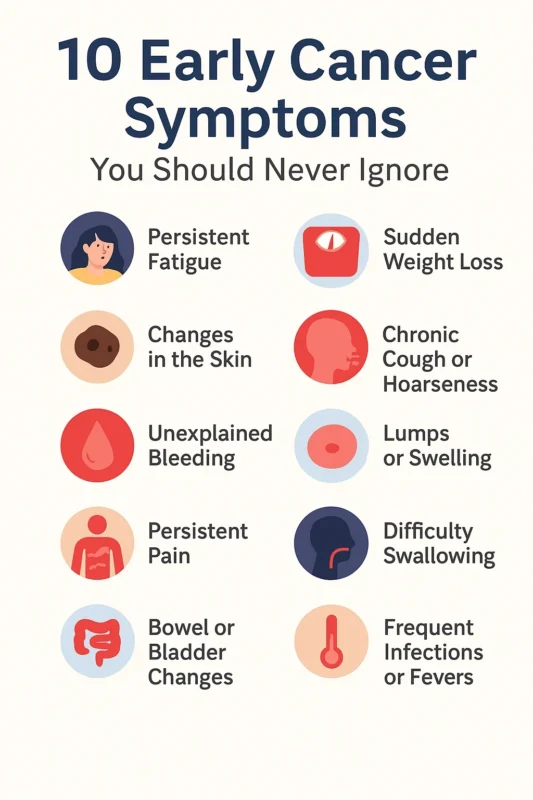
Recognizing symptoms of cancer in early stages can be life-saving. Many people ignore subtle changes, unaware of early warning signs of cancer. If you’re wondering how do you know if you have cancer or how to know if you have cancer, pay attention to these common indicators backed by research and real-life experiences.
- Persistent Fatigue
- Extreme tiredness that doesn’t improve with rest is one of the most frequent symptoms of cancer in early stages.
- Studies by Dr. T. Buchwald show that fatigue may result from systemic inflammation caused by abnormal cell growth.
- Real-life story: Emily, a 32-year-old teacher, ignored months of exhaustion before discovering early-stage leukemia. This highlights a key early warning sign of cancer and shows how to know if you have cancer.
- Extreme tiredness that doesn’t improve with rest is one of the most frequent symptoms of cancer in early stages.
- Sudden Weight Loss
- Losing more than 10 pounds without lifestyle changes is a critical symptom of cancer in early stages.
- Research by Sir Richard Doll links rapid, unexplained weight loss to gastrointestinal, pancreatic, and lung cancers.
- Many patients ask, how do you know if you have cancer? Sudden weight loss is often the first early warning sign of cancer noticed by doctors.
- Losing more than 10 pounds without lifestyle changes is a critical symptom of cancer in early stages.
- Changes in the Skin
- New moles, dark patches, or sores that don’t heal are important symptoms of cancer in early stages.
- The ABCDE rule (Asymmetry, Border, Color, Diameter, Evolving) is used for early detection of melanoma.
- Ignoring these changes delays diagnosis, making it essential to recognize early warning signs of cancer and understand how to know if you have cancer.
- New moles, dark patches, or sores that don’t heal are important symptoms of cancer in early stages.
- Chronic Cough or Hoarseness
- A cough or hoarseness lasting more than three weeks may indicate lung or throat cancer, a key symptom of cancer in early stages.
- Controversially, many long-term coughs are treated as infections first, delaying diagnosis. Knowing early warning signs of cancer like this helps answer how do you know if you have cancer.
- A cough or hoarseness lasting more than three weeks may indicate lung or throat cancer, a key symptom of cancer in early stages.
- Unexplained Bleeding
- Blood in stool, urine, or cough is an alarming symptom of cancer in early stages.
- Colorectal and bladder cancer research confirms that many cases are initially misdiagnosed.
- Recognizing such bleeding is an important early warning sign of cancer and a clear way to know how to know if you have cancer.
- Blood in stool, urine, or cough is an alarming symptom of cancer in early stages.
- Lumps or Swelling
- New lumps, especially in the breast, neck, or groin, are a major symptom of cancer in early stages.
- Research shows lymph node swelling can precede other symptoms.
- If you notice lumps, it’s an essential early warning sign of cancer and tells you how do you know if you have cancer.
- New lumps, especially in the breast, neck, or groin, are a major symptom of cancer in early stages.
- Persistent Pain
- Unexplained bone, chest, or abdominal pain is another symptom of cancer in early stages.
- Dr. Joe Tippens’ studies on pancreatic cancer highlight that persistent pain is often overlooked.
- Recognizing this pain can help identify early warning signs of cancer and answer the question, how to know if you have cancer.
- Unexplained bone, chest, or abdominal pain is another symptom of cancer in early stages.
- Difficulty Swallowing
- Chronic trouble swallowing or feeling food stuck in the throat is a symptom of cancer in early stages, often linked to esophageal or throat cancer.
- Dysphagia is frequently misdiagnosed as acid reflux. Awareness of this early warning sign of cancer helps understand how do you know if you have cancer.
- Chronic trouble swallowing or feeling food stuck in the throat is a symptom of cancer in early stages, often linked to esophageal or throat cancer.
- Bowel or Bladder Changes
- Prolonged constipation, diarrhea, or urinary problems can signal cancer, a key symptom of cancer in early stages.
- Colorectal and bladder cancer studies show early detection is often missed.
- Paying attention to these changes is an essential early warning sign of cancer and a way to know how to know if you have cancer.
- Prolonged constipation, diarrhea, or urinary problems can signal cancer, a key symptom of cancer in early stages.
- Frequent Infections or Fevers
- Recurring infections or unexplained fevers indicate a weakened immune system, another symptom of cancer in early stages.
- Hematologic cancer research shows abnormal white blood cell activity often precedes diagnosis.
- Recognizing these infections as early warning signs of cancer is critical for understanding how do you know if you have cancer.
- Recurring infections or unexplained fevers indicate a weakened immune system, another symptom of cancer in early stages.
Bonus Point :
Being aware of these symptoms of cancer in early stages and early warning signs of cancer can save lives. If you notice any persistent or unexplained changes, it is crucial to understand how to know if you have cancer and seek timely medical evaluation. Real-life cases show that ignoring subtle signs often leads to late-stage diagnoses.
Specific Symptoms by Cancer Type
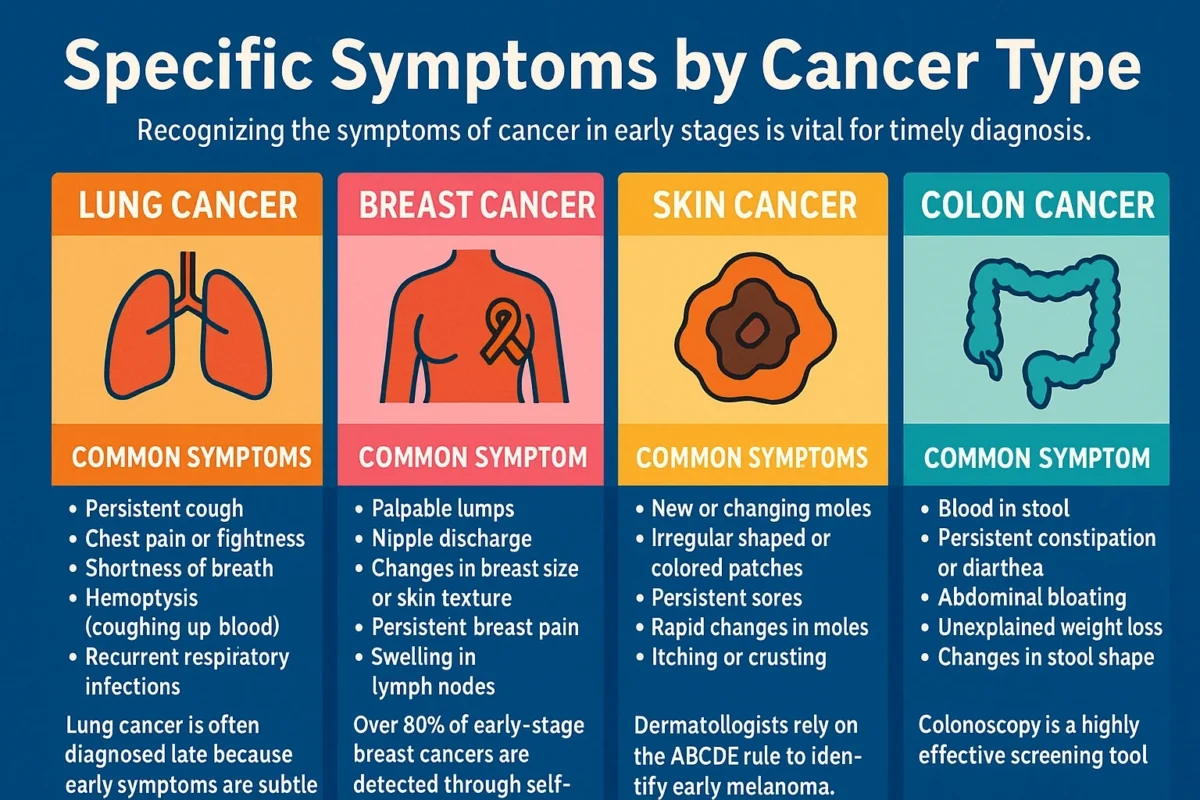
Recognizing the symptoms of cancer in early stages is vital for timely diagnosis. Each cancer type often has unique warning signs, and understanding these early warning signs of cancer can help people know how do you know if you have cancer and how to know if you have cancer. Research, clinical studies, and real patient experiences provide critical insights into these patterns.
1. Lung Cancer
Low-dose CT scans have been shown to detect early-stage lung cancer 20–30% more effectively than traditional X-rays, allowing for earlier intervention. Interestingly, studies indicate that 15–20% of lung cancer cases occur in non-smokers, challenging the common perception that only smokers are at risk. Persistent cough, one of the most frequent early warning signs of cancer, is often misdiagnosed as a minor infection or allergy, delaying diagnosis and treatment.
- Common Symptoms (Broader):
- Persistent cough that worsens over weeks or months.
- Chest pain or tightness that does not go away.
- Shortness of breath during routine activities.
- Hemoptysis (coughing up blood), sometimes only noticeable as streaks.
- Recurrent respiratory infections that fail to improve with standard treatment.
- Persistent cough that worsens over weeks or months.
- Research Insight (Broader):
- Lung cancer is often diagnosed late because early symptoms are subtle. The American Cancer Society notes that chronic cough and unexplained chest discomfort are early indicators in 40–50% of cases.
- Studies suggest that even non-smokers can develop lung cancer, highlighting controversies in traditional risk assumptions.
- Early detection improves survival: low-dose CT scans in high-risk populations detect tumors before they become symptomatic.
- John, 58, dismissed a lingering cough as seasonal allergies for months. Early imaging revealed stage I lung cancer, emphasizing the importance of identifying early warning signs of cancer.
- Lung cancer is often diagnosed late because early symptoms are subtle. The American Cancer Society notes that chronic cough and unexplained chest discomfort are early indicators in 40–50% of cases.
2. Breast Cancer
Over 80% of early-stage breast cancers are detected through self-exams and routine mammography, highlighting the importance of vigilance. Nipple discharge, present in about 10–15% of early cases, is frequently ignored or misattributed to hormonal changes. Early detection dramatically improves outcomes, with 5-year survival rates exceeding 90% when caught at stage I, making awareness of these symptoms of cancer in early stages crucial.
- Common Symptoms (Broader):
- Palpable lumps in the breast or underarm area.
- Nipple discharge, sometimes bloody or unusual in color.
- Changes in breast size, shape, or skin texture (dimpling, redness, or thickening).
- Persistent breast pain or tenderness that doesn’t correlate with menstrual cycles.
- Swelling or lumps in lymph nodes near the collarbone or armpit.
- Palpable lumps in the breast or underarm area.
- Research Insight (Broader):
- According to the Breast Cancer Research Foundation, palpable lumps are present in over 80% of early-stage cases detected through self-exams.
- Skin changes and nipple discharge are often overlooked; delays in evaluation can lead to more advanced disease.
- Some women are misdiagnosed with benign conditions like cysts or mastitis, showing why awareness of symptoms of cancer in early stages is critical.
- Sarah, 42, detected a small lump on self-exam. Timely screening confirmed early-stage breast cancer, demonstrating the importance of recognizing early warning signs of cancer.
- According to the Breast Cancer Research Foundation, palpable lumps are present in over 80% of early-stage cases detected through self-exams.
3. Skin Cancer
Dermatologists rely on the ABCDE rule (Asymmetry, Border, Color, Diameter, Evolving) to identify early melanoma. Non-melanoma skin cancers, like basal cell carcinoma, are often overlooked because patients dismiss persistent sores or patches as minor skin issues. Studies also show that UV exposure is the leading preventable cause of skin cancer, emphasizing the need for vigilance and regular skin cancer checks to catch early warning signs of cancer.
- Common Symptoms:
- New or changing moles, particularly asymmetrical ones.
- Irregularly shaped or colored skin patches.
- Persistent sores that do not heal or bleed intermittently.
- Rapid changes in existing moles (size, color, or texture).
- Itching, tenderness, or crusting of affected areas.
- New or changing moles, particularly asymmetrical ones.
- Research Insight :
- Dermatology studies show that the ABCDE rule (Asymmetry, Border, Color, Diameter, Evolving) is a reliable method for early melanoma detection.
- Non-melanoma skin cancers, like basal cell carcinoma, can present as persistent sores often ignored by patients for months.
- Many early cases are dismissed as minor skin conditions, delaying proper diagnosis.
- Mark, 35, noticed a dark patch expanding over weeks. Dermatological evaluation detected melanoma early, highlighting how to know if you have cancer through attentive observation of symptoms of cancer in early stages.
- Dermatology studies show that the ABCDE rule (Asymmetry, Border, Color, Diameter, Evolving) is a reliable method for early melanoma detection.
4. Colon Cancer
Colonoscopy is a highly effective screening tool, capable of detecting precancerous polyps and reducing colorectal cancer incidence by up to 90%. Approximately 70% of early-stage colorectal cancers present with subtle symptoms, such as mild bloating or changes in bowel habits, which are easily overlooked. Diet, age, and family history are significant risk factors, yet many patients delay screening due to embarrassment or fear, underscoring the importance of knowing how to know if you have cancer.
- Common Symptoms :
- Blood in stool, either bright red or dark.
- Persistent constipation, diarrhea, or alternating bowel habits.
- Abdominal bloating, discomfort, or cramps without dietary cause.
- Unexplained weight loss or fatigue associated with digestive issues.
- Changes in stool shape (narrowing or ribbon-like stool).
- Blood in stool, either bright red or dark.
- Research Insight :
- The National Cancer Institute notes that gastrointestinal changes are among the first symptoms of cancer in early stages.
- Colonoscopy and stool tests are essential for early detection, as subtle bowel changes are often misattributed to diet, stress, or hemorrhoids.
- Many patients delay screening due to embarrassment or fear, leading to diagnosis at advanced stages.
- Linda, 50, ignored intermittent abdominal discomfort and occasional blood in stool. Colonoscopy confirmed early-stage colorectal cancer, demonstrating the importance of early warning signs of cancer and knowing how do you know if you have cancer.
- The National Cancer Institute notes that gastrointestinal changes are among the first symptoms of cancer in early stages.
Bonus Tip :
Different cancers exhibit distinct symptoms of cancer in early stages, and being aware of these early warning signs of cancer is critical. Recognizing persistent, unexplained changes in the body is the first step in answering how to know if you have cancer or how do you know if you have cancer. Routine screening, research-backed awareness, and prompt medical evaluation can significantly improve outcomes.
Why People Miss These Symptoms
Many people, especially in the United States, often dismiss early warning signs of cancer because they feel “normal” or explain them away with everyday stressors.
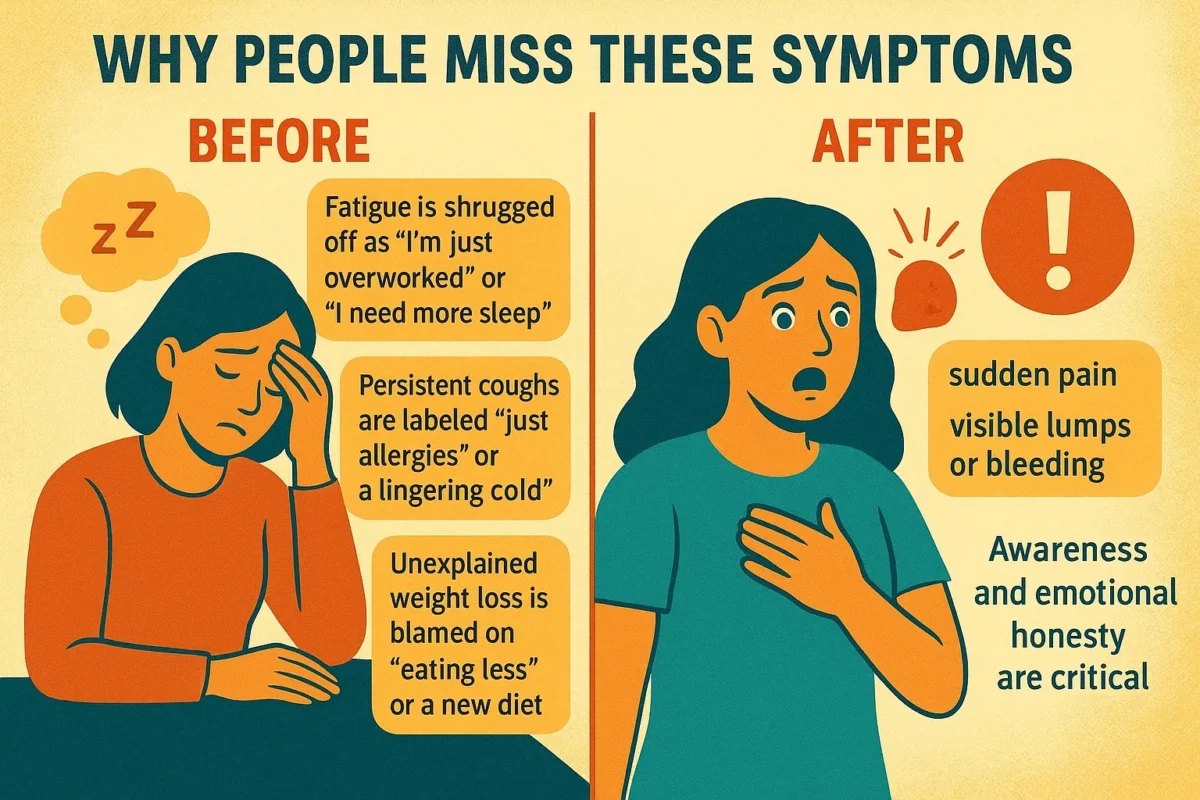
Before:
- Fatigue is shrugged off as “I’m just overworked” or “I need more sleep.”
- Persistent coughs are labeled “just allergies” or “a lingering cold.”
- Unexplained weight loss is blamed on “eating less” or a new diet.
Why This Happens :
- Humans naturally normalize discomfort; small, persistent changes don’t seem urgent until they worsen.
- Emotional denial plays a role: fear of discovering something serious can subconsciously make people ignore symptoms of cancer in early stages.
- Societal pressures and busy lifestyles lead individuals to prioritize work, family, or daily routines over their health, delaying medical evaluation.
After:
- By the time these ignored early warning signs of cancer become severe such as sudden pain, visible lumps, or bleeding the disease is often more advanced and treatment more difficult.
- Real-life stories show dramatic turnarounds: patients who recognized subtle signs early often undergo less invasive treatments and have significantly higher survival rates.
Main Factor : Awareness and emotional honesty are critical. Understanding the difference between normal fluctuations in health and persistent symptoms of cancer in early stages can transform outcomes from delayed, complicated treatment to timely, potentially life-saving intervention.
How Doctors Recognize Symptoms
Doctors don’t just rely on visible or reported symptoms—cancer detection often involves a combination of subtle clues, investigative tools, and proactive screening strategies.
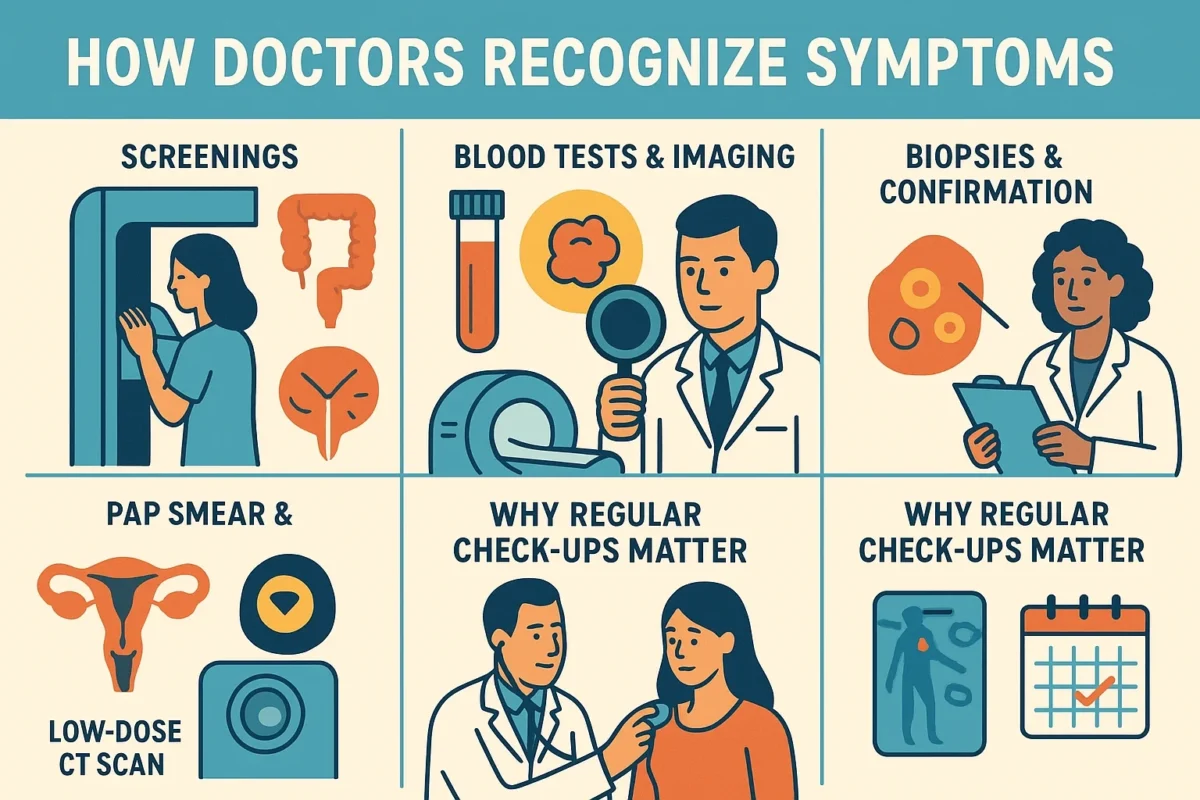
Screenings:
- Routine screenings like mammograms, colonoscopies, Pap smears, and low-dose CT scans are key to identifying cancers before symptoms appear.
- Fact: In the US, insurance coverage often dictates who gets screened and how frequently, meaning many early-stage cancers go undetected in populations without regular healthcare access.
Blood Tests & Imaging:
- Blood markers (like PSA for prostate cancer or CA-125 for ovarian cancer) and imaging techniques (CT, MRI, PET scans) can reveal abnormalities before patients notice anything.
- Hidden fact: These tests are not foolproof false negatives and false positives are common. Studies show that up to 20–30% of early-stage cancers are missed initially, leading to delayed diagnosis.
Biopsies & Confirmation:
- When suspicious tissue is found, a biopsy confirms the diagnosis. However, the process can be invasive and sometimes delayed due to healthcare costs, waiting lists, or misinterpretation of imaging results.
- Realistic insight: Some patients in the US may have abnormal screening results but face delays in follow-up due to insurance approvals, specialist availability, or systemic inefficiencies.
Why Regular Check-Ups Matter:
- Even if you feel healthy, cancers can develop silently, showing no obvious symptoms of cancer in early stages.
- Doctors combine subtle symptom patterns, lab data, imaging, and personal risk factors (family history, lifestyle, environment) to identify early warning signs of cancer that most people would never notice on their own.
United States – Focused Hidden Truths About Cancer Detection
While public campaigns emphasize early detection, there are several hidden truths about cancer diagnosis in the United States that most people don’t realize:
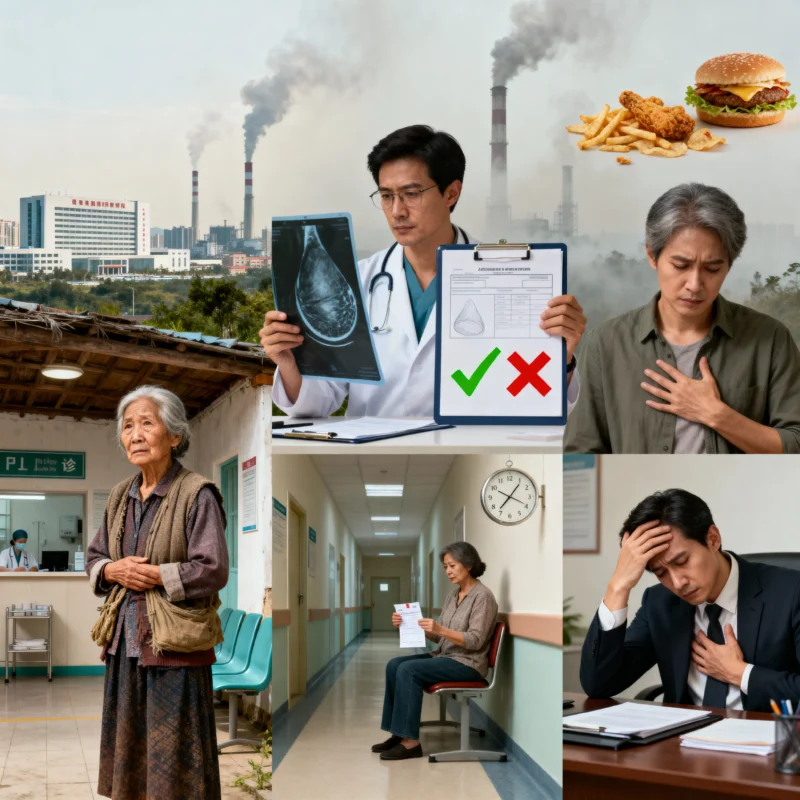
=> Understanding these hidden truths empowers you to take control of your health. Don’t rely solely on feeling “healthy” advocate for screenings, track persistent changes in your body, and learn how to know if you have cancer before it becomes advanced. Early awareness, proactive evaluation, and consistent follow-ups are often the difference between treatable and advanced disease.
Access to Screening Isn’t Equal
Not everyone gets timely mammograms, colonoscopies, or Pap tests. Insurance coverage, income level, and geographic location heavily influence who receives screenings. Rural populations and uninsured individuals often face delayed or missed early detection, allowing cancers to progress unnoticed.
Tests Are Not Perfect
Screening tools like mammograms, Pap smears, PSA tests, and low-dose CT scans have limits. False negatives (missed cancers) occur in up to 20–30% of cases, while false positives can lead to unnecessary stress, biopsies, or procedures. Early symptoms of cancer in early stages can be subtle enough to evade even advanced imaging.
Delays in Follow-Up Are Common
Even when screenings show abnormalities, patients may face long waits for specialist appointments, insurance approvals, or additional tests. Real-world data shows that these delays can push diagnosis from stage I to stage II or III, complicating treatment.
Early Symptoms Are Often Overlooked
Subtle warning signs like fatigue, mild pain, or slight weight loss are frequently dismissed as stress, aging, or diet-related changes. Many Americans only discover cancer after early warning signs of cancer become severe, reducing survival chances.
Lifestyle & Environmental Factors Are Underestimated
Factors such as chronic stress, exposure to pollutants, diet, and sedentary lifestyle can accelerate cancer progression, yet public discussions often downplay their impact. Awareness of these hidden contributors can help people recognize subtle symptoms of cancer in early stages before they escalate.
Practical Tips: When to See a Doctor
Knowing when to see a doctor can make the difference between catching cancer early or facing advanced disease. Here’s a realistic, matter-of-fact guide based on clinical practice and real patient experiences:
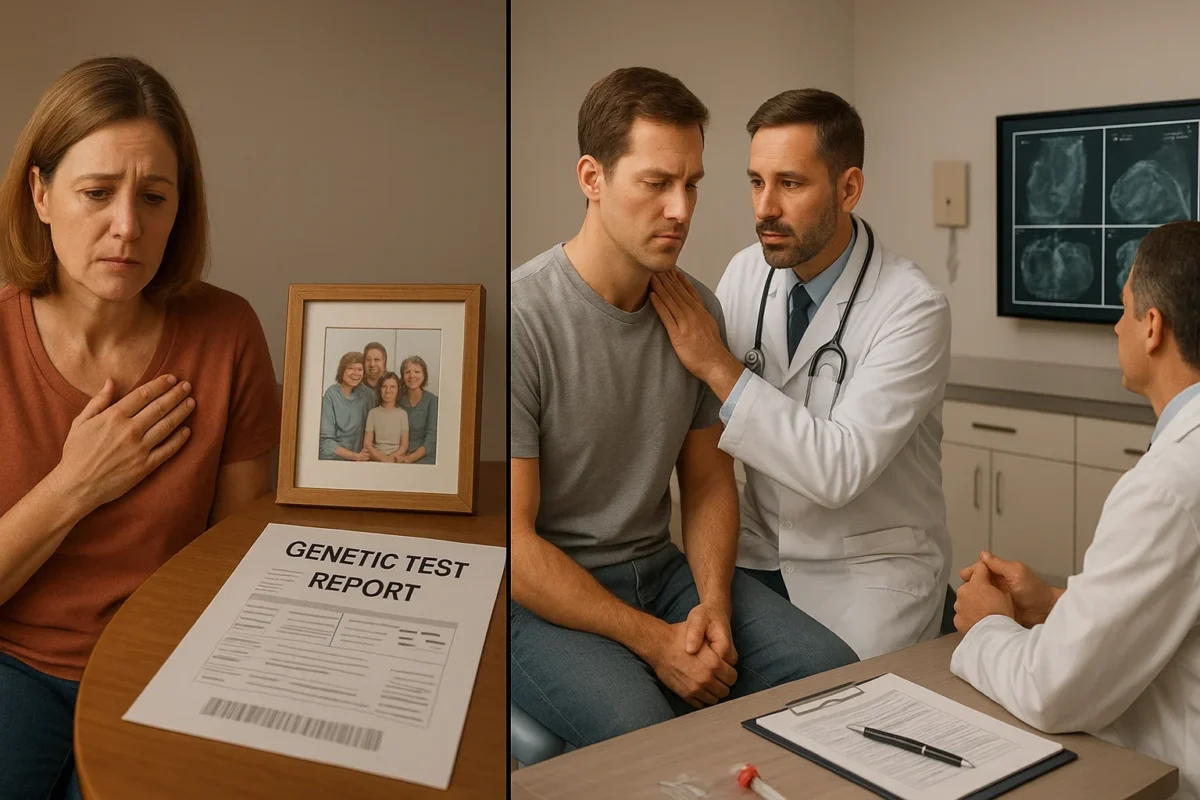
- Persistent Symptoms Lasting 2–3 Weeks or More
- If fatigue, cough, skin changes, pain, or other unusual symptoms linger beyond two to three weeks, don’t assume it’s minor. In clinical practice, doctors use this timeframe as a threshold to order initial tests like blood work, imaging, or referrals to specialists.
- If fatigue, cough, skin changes, pain, or other unusual symptoms linger beyond two to three weeks, don’t assume it’s minor. In clinical practice, doctors use this timeframe as a threshold to order initial tests like blood work, imaging, or referrals to specialists.
- Family History of Cancer
- Individuals with close relatives who had breast, colon, ovarian, or other cancers are at higher risk. Physicians recommend earlier and more frequent screenings for these patients, including genetic counseling when appropriate.
- Individuals with close relatives who had breast, colon, ovarian, or other cancers are at higher risk. Physicians recommend earlier and more frequent screenings for these patients, including genetic counseling when appropriate.
- Persistent Pain, Unexplained Lumps, or Bleeding
- Any new lump, unexplained bruising, persistent abdominal or bone pain, or blood in stool, urine, or cough should trigger immediate medical evaluation. In reality, this often starts with a physical exam, followed by imaging or biopsy if needed.
- Any new lump, unexplained bruising, persistent abdominal or bone pain, or blood in stool, urine, or cough should trigger immediate medical evaluation. In reality, this often starts with a physical exam, followed by imaging or biopsy if needed.
- Adults Over 40: Annual Screenings
- Standard United States guidelines advise that adults over 40 schedule yearly check-ups that include age-appropriate cancer screenings mammograms, colonoscopies, Pap smears, low-dose CT scans for high-risk patients, and blood tests for early detection markers.
- Fact: Many cancers are asymptomatic in early stages, so routine screenings often catch disease before symptoms of cancer in early stages even appear.
- Standard United States guidelines advise that adults over 40 schedule yearly check-ups that include age-appropriate cancer screenings mammograms, colonoscopies, Pap smears, low-dose CT scans for high-risk patients, and blood tests for early detection markers.
Matter-of-Fact Takeaway:
Don’t wait for dramatic symptoms. If any of these red flags persist, act promptly. Early evaluation and screenings are the most reliable ways to detect early warning signs of cancer and answer the question of how do you know if you have cancer before it becomes serious.
FAQS
1. How does cancer make you feel?
Cancer can cause persistent fatigue, unexplained weight loss, mild pain, or frequent infections. These are common symptoms of cancer in early stages and can signal early warning signs of cancer.
2. What are the main signs of cancer?
The main signs include lumps, unexplained bleeding, chronic pain, skin changes, or digestive issues. Recognizing these symptoms of cancer in early stages helps identify early warning signs of cancer.
3. How would I know if I had cancer?
Persistent, unexplained changes like new lumps, bowel problems, or unusual fatigue are key indicators. Doctors combine these with screenings and tests to detect early warning signs of cancer.
4. Does our body warn us before cancer?
Yes, subtle clues like minor pain, weight loss, or frequent infections often appear first. Paying attention to these symptoms of cancer in early stages can reveal early warning signs of cancer.
5. What age is cancer most common?
Cancer risk increases with age, most often appearing after 50, though some types occur earlier. Early screenings help detect symptoms of cancer in early stages before advanced disease develops.
Summary
Cancer often starts silently, with subtle symptoms of cancer in early stages like fatigue, unexplained weight loss, persistent pain, or lumps. Early detection through awareness, screenings, and timely medical evaluation can save lives. Different cancers show unique warning signs, and recognizing these early warning signs of cancer is key to catching disease before it becomes advanced. Paying attention to persistent changes and acting promptly is the most effective way to know if you have cancer.

